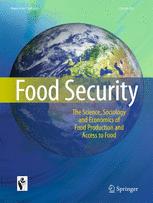Nucleus-outgrower schemes as an alternative to traditional smallholder agriculture in Tanzania – strengths, weaknesses and policy requirements
Brüntrup, Michael / Fabian Schwarz / Thomas Absmayr / Jonas Dylla / Franziska Eckhard / Kerstin Remke / Konrad Sternisko
External Publications
(2018)
in: Food Security 10 (4), 807-826
DOI: https://doi.org/10.1007/s12571-018-0797-0
Volltext/Document
The public debate about the right type of agriculture for Sub-Saharan Africa (SSA) often constructs a dichotomy between smallholders and large-scale agriculture. This over-simplification ignores some important intermediary forms for organising agriculture, including nucleus-outgrower schemes (NOSs). NOSs promise to combine the benefits of both while potentially reducing, though not avoiding, (part of) their drawbacks. This article analyses the conditions under which NOSs are feasible and beneficial for investors, outgrowers and rural development for selected value chains in Tanzania. It is based on an empirical study comprising 276 qualitative interviews with various stakeholders conducted in central Tanzania in spring 2015 on 10 NOSs in three subsectors (rice, sugar cane and tea) in different stages of realisation (planning, establishment, full production and failure or near-failure). The study examines why investments succeed or fail in different stages, the socio-economic impacts and various policies important for their fate. Findings show that there are many challenges to successfully implementing NOSs in Tanzania, including national policies on the business environment, on agriculture in general and on specific subsectors, and, especially, on land issues. Nevertheless, these schemes seem to have considerable potential to support local development, particularly by providing employment and salaries, incomes for outgrower farmers, infrastructure and corporate social responsibility (CSR) projects as compensation for loss of access to land for the community. The specific details of a particular business model influence the opportunities and risks, but no single model seems to be superior; much depends on the subsector structure and the services already available. In general, policies to attract and steer NOSs in Tanzania are not yet sufficiently developed, coordinated or implemented.
Further IDOS experts
-
Altenburg, Tilman
Economic Geography
-
Asimeng, Emmanuel Theodore
Urban Planning, Sustainability
-
Donnelly, Aiveen
Politcal Science
-
El-Haddad, Amirah
Economy
-
Gubbini, Emily
Social Science
-
Kativu, Saymore Ngonidzashe
Geography
-
Kornher, Lukas
Economics
-
Loewe, Markus
Economy
-
Mudimu, George Tonderai
Agricultural policy economics
-
Reich, Charlotte
Economics
-
Rukundo, Emmanuel Nshakira
Development Economics
-
Sakketa, Tekalign Gutu
Agricultural / Development Economics
-
Sommer, Christoph
Economist
-
Sowa, Alina
Economics
-
Strohmaier, Rita
Economy
-
Stöcker, Alexander
Economics
-
Vogel, Tim
Economy
-
Vrolijk, Kasper
Economy
-
Zintl, Tina
Political Scientist


